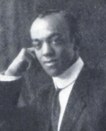 The only child of a prosperous Chicago family, Fenton Johnson (1888-1958) spent most of his time pursuing the arts, and later in editing and journalism. But between 1914 and 1916 he produced three volumes of poetry A Little Dreaming, Visions of the Dusk, and Songs of the Soil, which, together with the posthumous 42 WPA Poems, provide an extraordinary look at the evolution of black American poetry. As such, he deserves to be considered not only one of the most important black American poets, but also one of the earliest stars—along with Harriet Monroe, Hamlin Garland, and Benjamin Franklin Taylor—of Chicago literature.
The only child of a prosperous Chicago family, Fenton Johnson (1888-1958) spent most of his time pursuing the arts, and later in editing and journalism. But between 1914 and 1916 he produced three volumes of poetry A Little Dreaming, Visions of the Dusk, and Songs of the Soil, which, together with the posthumous 42 WPA Poems, provide an extraordinary look at the evolution of black American poetry. As such, he deserves to be considered not only one of the most important black American poets, but also one of the earliest stars—along with Harriet Monroe, Hamlin Garland, and Benjamin Franklin Taylor—of Chicago literature.
Fenton Johnson wrote—as many black poets were expected to do—dialect poems like “Questions” (Part Three):
“Whaih’s de sunlight, Mammy Lou?”
“Why Ah thought you allus knew
Dat yo’ hea’t’s de wahm sunlight
An’ you’ love’s de moon o’ night.”
As many black poets were also supposed to do, he wrote formal, antique verse like “A Fragment”:
One sunset when the skies were deepest red,
As if they blushed for all the human sins,
I saw her gather daffodils, and sighed,
For she was sweeter far than those poor flowers…
But though he started tackling more substantial subjects under the inevitable influence of Paul Laurence Dunbar, he then proceeded to “succumb,” as Arna Bontemps put it, “to a more rugged influence.” Dropping all dialect poems and formal poetry in general, he turned to free verse (perhaps under the influence of Whitman—only decidedly without Whitman’s optimism) and began expressing a profound fatalism and despair that stunned America, which had wanted—as it still does—to think of blacks as “happy.” In his poem “The Daily Grind,” for example, Johnson conceives of man as caught between Nature and the System. The first may intend “something fine,” but the human construct—the System—blighted by racism—intends grinding slavery. All man can do is watch the eternal struggle of the two. “If Nature forgets you, / If the System forgets you,” / “God has blest you,” Johnson concludes.
In introductory comments on Johnson in his ground-breaking anthology The Book of American Negro Poetry, James Weldon Johnson says that Fenton Johnson’s startling effect on American poetry, “…was in some degree due to the fact that…[his poetry expressed] an idea so foreign to any philosophy of life the Negro in America had ever preached or practiced. Fenton Johnson is the only Negro poet who has ever sounded this precise note.” His most famous poems in this manner are “Tired” (one of four Johnson poems I included in my Black Writing from Chicago), “The Banjo Player,” and “The Scarlet Woman”—all included in James Weldon Johnson’s enormously influential collection. “The Scarlet Woman” ends with the famous line, “Gin is better than all the water in Lethe.” And “Tired” begins, “I am tired of work; I am tired of building up somebody else’s civilization.” It addresses M’Lissy Jane, saying, “Throw the children into the river; civilization has given us too many. It is better to die than it is to grow up and find out that you are colored.”
But even earlier, in poems like “Prelude,” the first poem in Visions of the Dusk, Fenton Johnson already showed a restlessness with traditional verse and issues a veiled critique of what’s expected of black poets.
And yet some say to me, “O Man of Dusk,
Give us they songs in broken Afric tongue,—
The music of the peasant in the South—
The native strain alone is poetry.
Be thou as Burns or Dunbar was,
Be thou as Lowell in his adobe home;
The humble peasant is the truest bard.”
It was a request from the world of white poetry that Fenton Johnson was finally to deny in spectacular fashion.
♦ I included “Tired,” “Prelude,” “Questions,” and “A Fragment” in my book Black Writing from Chicago: In the World, Not Of It?
♦ Go to a list of Black Writers and Chicago Writers on this site, and the Teaching Diversity main page.
♦ This article is the basis of remarks I made at Chicago’s Poetry Foundation upon Fenton Johnson’s induction into the Chicago Literary Hall of Fame, September 2017. Read those remarks HERE, and learn more about the Chicago Literary Hall of Fame.